The strike wave in the UK is a rare source of hope
Cross-posted from Positive Money
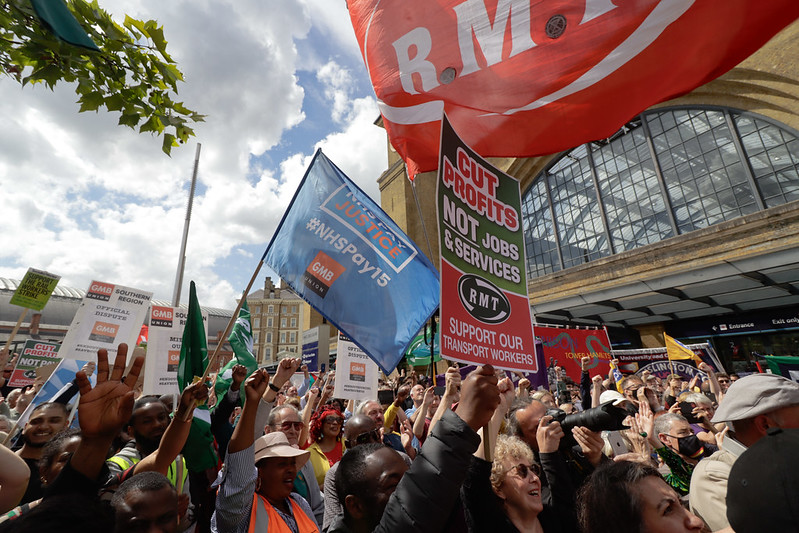
“Ask yourself, do you agree that women should have maternity leave? Do you agree that you need health and safety within the workplace? Do you agree that you should have sick pay? Do you agree that you should have holiday pay? And if it’s yes, people stood on a picket to fight for that for you. That’s why you should join a union.” – RMT Union Rep, Bristol
Earlier this month, Amazon warehouse workers in Tilbury went on strike in response to a measly 35p increase in pay. Workers spontaneously gathered in the canteen for two days to protest the offer and have been demanding a £2 pay increase. Amazon workers are not union-affiliated, but have close ties to the GMB union, who have been advising Amazon staff in their campaign for better conditions and fair pay.
Amazon is notorious for their union-busting. When Amazon workers in New York tried to unionise, Amazon stuck racist anti-union posters in hallways and bathroom stalls, created anti-union Facebook Ads in English and Spanish, and even fired workers who were attempting to organise. However, by building a mutually supportive community from the ground up, Staten Island Amazon workers were able to overcome the odds and win Amazon’s first union.
In the UK, Amazon attempted to break up the strike, with managers telling workers “Continuing like this all night, [is] not going to change anything”. In 2021, Amazon’s profits were up 60%, totalling £204,000,000, but Amazon still paid no tax, due to a tax relief scheme granted to Amazon for ‘investment in infrastructure’ and ‘job creation’. However, it’s clear that Amazon isn’t genuinely investing in a fairer economy when the company’s shareholders have repeatedly rejected motions to improve working conditions for employees or introduce environmental protections.
Rampant profiteering and below-inflation pay offers across a range of sectors has led to similar walkouts by BT and Openreach workers, Barristers, airport check-in staff and refuse workers. Most notoriously, members of the RMT union, which represents transportation workers, have galvanised the public by coordinating strikes over the summer. This comes after Network Rail offered workers a 4% pay increase (well below the amount needed to manage the rising cost of living) and threatened compulsory redundancies if they went ahead with the strike. Network Rail boss, Andrew Haines earns nearly £600,000 a year, and railway companies amassed £500 million profits from public subsidies received during the pandemic. Despite the media’s focus on the demand for pay rises, the RMT are also responding to Network Rail’s decision to reduce track safety inspections, close ticket offices, cut down the number of safety inspectors and introduce unsociable hours which all form part of their long term plans to ”modernise” the network.
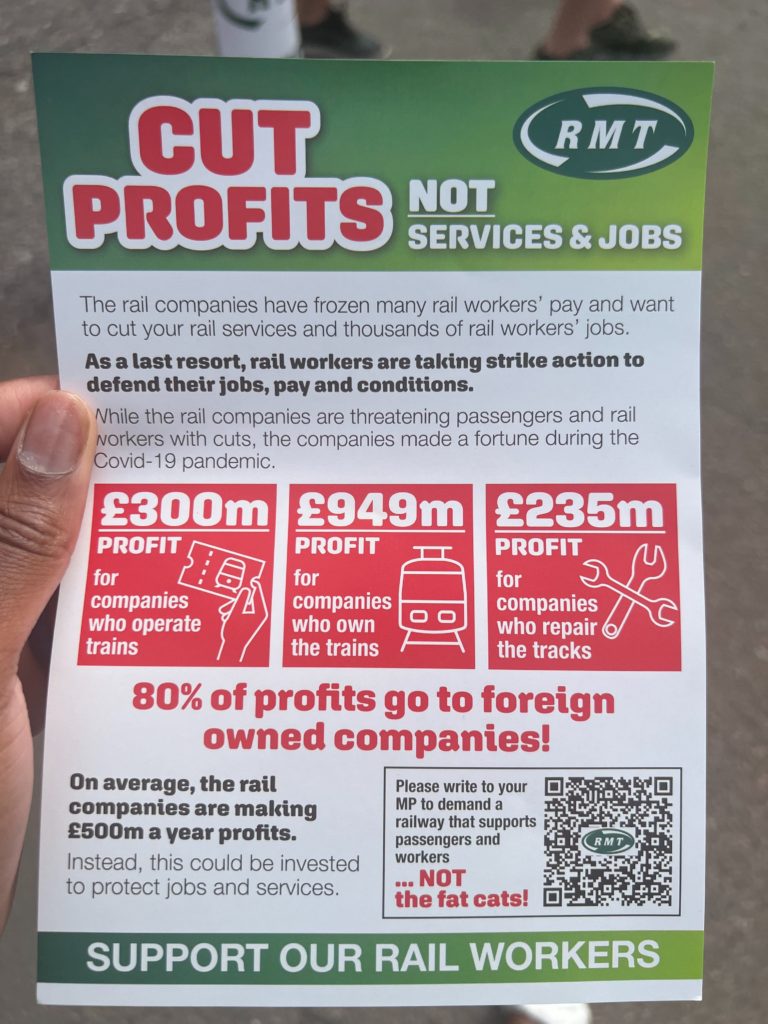
The ongoing strikes are in direct response to the cost of living crisis, triggered by runaway inflation which reached 10.1% this month. To combat inflation, the Bank of England hiked interest rates from 1.25% to 1.75% at the start of August. However, raising interest rates is an ineffective tool against the current sources of inflation and will make things worse for struggling households. The Bank of England has forecasted a recession in the autumn, with the Governor, Andrew Bailey, repeating his call on workers to show wage restraint or risk ‘embedding inflation’. However, Bailey’s comments are insensitive and out of touch; the Bank of England paid out £23 million in bonuses to staff last year, and Bailey himself earns £597,592 a year. Meanwhile, real wages have been falling at the fastest rate in a decade.
People have been fighting back against claims that workers demanding wage increases are driving inflation. The actual drivers of inflation can be attributed to external factors, such as the war in Ukraine, the aftershocks of the COVID-19 pandemic, our overreliance on fossil fuels and financial speculation. The General Secretary of the RMT, Mick Lynch, called out the media for wrongly blaming workers for driving up the cost of living, explaining how public sector workers haven’t had a pay rise in a decade and that “it’s profit-taking that’s causing inflation.” This argument was also put forward by economist James Meadway, who has refuted claims there’s a wage price spiral, insisting there is actually a ‘profit price spiral’.
Oil and gas companies, alongside energy suppliers, have largely benefitted from surges in energy prices, with E.ON announcing £3.6 billion in profitsearlier this month and Shell, BP and British Gas parent-company Centrica announcing record-breaking profits at the end of July. But with the energy price cap increasing to £3,523 in October, and again to £4,210 in January, the number of UK households in fuel poverty will be pushed up to 9.2 million in October, and then to 10.5 million in early 2023. With the outgoing Prime Minister Boris Johnson ruling out emergency measures until a new leader is elected, it’s unsurprising thousands of people are turning to trade unions or using alternate forms of direct action to protect their jobs and wellbeing, and protest the cost of living scandal.
Positive Money joined RMT picket lines both in Bristol and Hitchin to ask for their perspective on the cost of living crisis and why the strikes are needed. The stark difference between workers’ wages and profits was a recurring topic amongst the people we spoke to.
“We want to raise the standard of living for working class people,” responded a female Regional Organiser for the RMT. She continues: “We, the workers, our labour creates the profit, we believe that we should have a fair share of it. What’s being framed by those that have the most, those that have already got stockpiles of money [and are] adding to that stockpile money that they’ll never spend in one lifetime.”
The prospect of wealth redistribution has been absent from the leadership bids made by both Liz Truss and Rishi Sunak. Instead, both candidates have promised to lower taxes, despite polling suggesting that the public don’t support tax cuts — especially if they come at the cost of even more cuts to public services. Both candidates ahve also failed to commit to providing emergency help for the poorest households, and are taking a hard line in order to appease the membership who will be voting for them. Even more disconcerting, Liz Truss is adamant on introducing anti-union legislation in order to disempower trade unions.
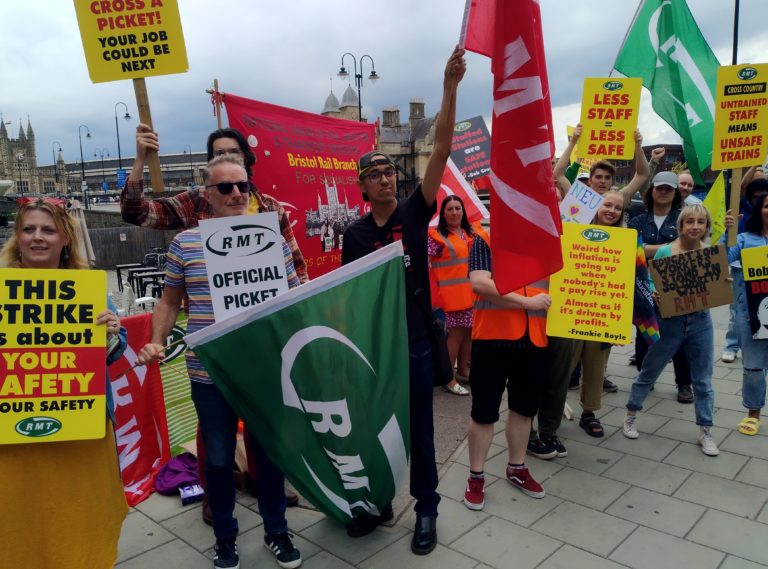
At the picket, we learned that there are specific challenges that often impact the gender makeup of picket lines. The Regional Officer we interviewed explained how childcare responsibilities often prevented women from joining a picket, but the RMT had made provisions to encourage more women to attend.
“What’s fantastic is the amount of women on the picket line now, which is great to see [as] in the past it is usually men on picket lines. But we’ve really now raised the bar, we at RMT Bristol, managed to encourage women to join us on the picket line.”
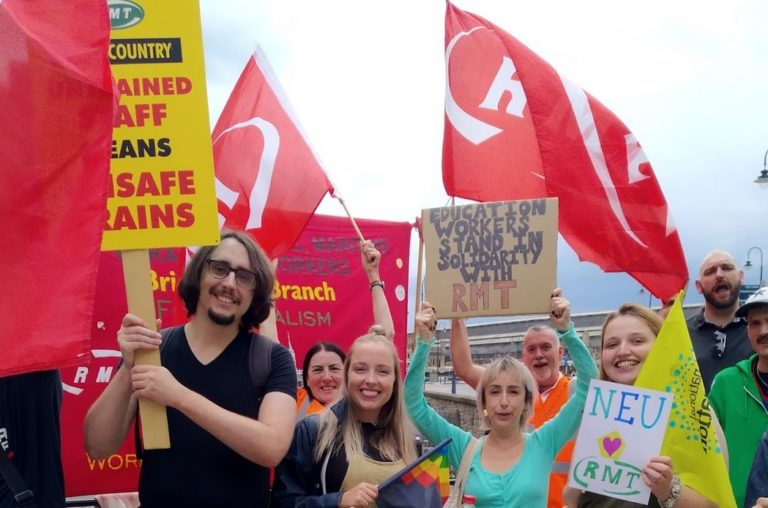
“From 6am in the morning till 6pm in the evening, we had the most tremendous support from cars, beeping lorries, beeping buses, drivers beeping. We had visitors to the picket line, bringing us food, so much food. If it gets leftover at the end, we actually give it away to cleaners in our station, or the homeless around the corner.”
The strikes have been a remarkable show of solidarity, but despite the strong public support, the mainstream media coverage has often been misleading, and could well be interpreted as an attempt to pit workers against one another by comparing the average pay of train drivers (who are represented by the ASLEF union) to nurses, criticising Mick Lynch’s salary and Piers Morgan comparing him to a cartoon villain. The mischaracterisation and demonisation of Mick Lynch and the RMT hadn’t gone unnoticed by workers we spoke to at the picket line outside Hitchin Network Rail depot, who spoke with us about the tone of coverage.
“How it’s portrayed on TV and the media and stuff like that is different to what is actually happening in real life. We think it’s dangerous what they’re [Network Rail] doing, and what their proposals are. They want to cut the quality of inspections down and [introduce] workloads that don’t suit [us] so they want less people working and more work to be done.”
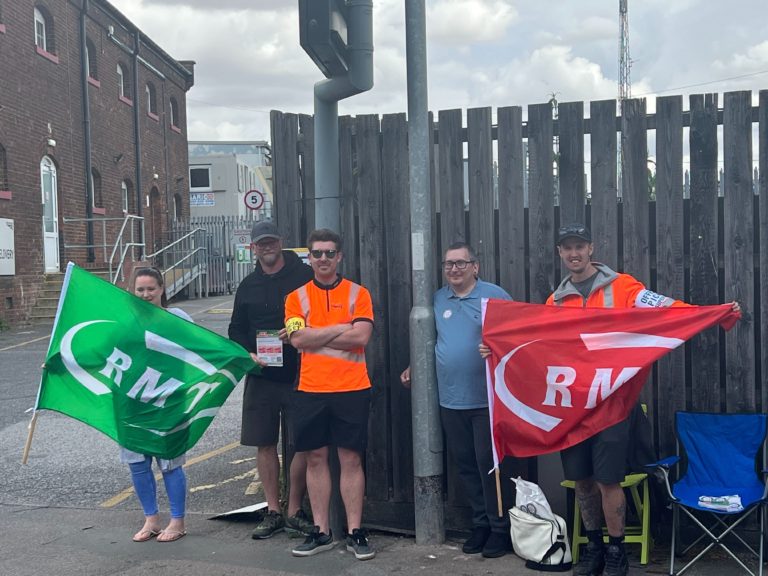
Speaking to trade unionists on the ground was eye-opening, and revealed the extent their voices have been obscured by the media. Although Mick Lynch has proven to be a powerful orator and a formidable force on the airwaves, it’s vital to remember he’s backed by about 80,000 members who made a collective decision to strike and fight for fairer and safer working conditions — the power of the union to take collective action rests on a foundation of mutual support and working class solidarity. There is a clear desire across the UK for systemic change, shown within the popularity of new campaign groups such as Don’t Pay UK, who are mobilising people to cancel their direct debits in response to rising energy bills in October, and the launch of the brand new campaign Enough is Enough, featuring a widely shared video with a clear message for people to come together to hold rallies, organise community groups and attend picket lines in response to the cost of living crisis.
The resurgence of trade unions and widespread strike action is long overdue, and shows that people have had enough of the ruthless economic logic peddled by top officials at the Bank of England and the government that insists people must accept a system that entrenches low pay, poverty, unemployment and poor working conditions. In reality, the cost of living scandal is a political choice, made to protect the profits of the big banks and corporations that are driving the UK towards higher inequality, energy insecurity, and climate breakdown.
Support us and become part of a media that takes responsibility for society
BRAVE NEW EUROPE is a not-for-profit educational platform for economics, politics, and climate change that brings authors at the cutting edge of progressive thought together with activists and others with articles like this. If you would like to support our work and want to see more writing free of state or corporate media bias and free of charge. To maintain the impetus and impartiality we need fresh funds every month. Three hundred donors, giving £5 or 5 euros a month would bring us close to £1,500 monthly, which is enough to keep us ticking over.


Be the first to comment